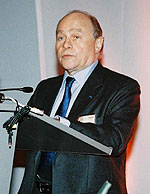
European innovation has been described as "at risk" in a recent article by Chris Jones, if delays to the introduction of the Community Patent continue.
Measuring "innovation" through patent applications, Europe is filing far fewer applications than the rest of the world. Arguably relevant here, however, is the very nature of European innovation cultures, including the existence of very small enterprises (of just a few people), and the possible lack of access on the part of such small players to the rather expensive inv
 estment of patent protection. Therefore, underpinning European policy and legal developments is the cost of the system itself and the need to ensure the diversity of players taking advantage of the system. Indeed, Professor Alain Pompidou, the President of the European Patent Office (EPO), is quoted in the Jones as saying, "The systematic use of patents to protect technical innovations is important if the EU's Lisbon strategy is to be a success. One aim of an effective innovation policy should therefore be to develop patent use among European companies, especially small and medium-sized firms." And in an interview at the end of last year, Pompidou stressed the importance of the patent system in this context: "The EPO has a clear role to play in the innovation process in Europe. By securing the transition from invention to innovation and facilitating access to the market-place, the patent system constitutes the key mechanism for such a transformation process."
estment of patent protection. Therefore, underpinning European policy and legal developments is the cost of the system itself and the need to ensure the diversity of players taking advantage of the system. Indeed, Professor Alain Pompidou, the President of the European Patent Office (EPO), is quoted in the Jones as saying, "The systematic use of patents to protect technical innovations is important if the EU's Lisbon strategy is to be a success. One aim of an effective innovation policy should therefore be to develop patent use among European companies, especially small and medium-sized firms." And in an interview at the end of last year, Pompidou stressed the importance of the patent system in this context: "The EPO has a clear role to play in the innovation process in Europe. By securing the transition from invention to innovation and facilitating access to the market-place, the patent system constitutes the key mechanism for such a transformation process."Despite this support, the Community Patent has had quite a troubled history. Discussions have continued for other 30 years, and yet the Community Patent Convention (CPC) continues to stall. The most recent version, the Amended CPC (1989), is yet to come into force. On the other hand, the Community Trade Mark and Community Design have proceeded successfully.
In 2000 the European Commission revitalised discussion on the Community patent, on the basis that a European wide patent would be a tremendous advantage to European innovation, and published a proposal for a Council Regulation on the Community Patent. In 2003, the Common Political Approach was agreed, but to date this earlier enthusiasm has become somewhat distracted.
The European Patent Convention (EPC) sets out the legal framework for states to come to special agreements concerning translations, as well as the institution of a central court to enforce the Community patent.
In 2005, the EPO pushed the discussions in the direction of the implementation of the London Agreement, which would allow for EPO States to waive their right under Art 65 ("Translation of the Specification of the European Patent") of the EPC. Art 65 gives a State the right to require a full translation into one of that State's official languages. In other words, the patent must be filed in one of the EPO's official languages (French, English, or German). However, at present, the patent must also be translated into the official language of any State in which it is it be protected. Under the London Agreement, the patent would be protected without translation. Therefore, a patent could be filed in German, and nevertheless protected in France despite no French translation (although it may be that courts would require translation in proceedings).
The London Agreement was lauded as recently as yesterday, in a press release of the EPO, where its adoption was explicitly advocated towards saving European firms up to EUR 500 million each year. However, at this stage, the Agreement is yet to come into force. It will come into force only when 8 signatories - including France, UK, and Germany - have ratified the Agreement. Germany and the UK have ratified the Agreement (a consultation on the ratification process was undertaken by the UK Patent Office in 2004). But its progress is stalled until France does so - which by all accounts seems unlikely.
The European Patent Litigation Agreement (EPLA) is a similar exercise in efficiency, providing for the establishment of a European Patent Court and, thus, greater access to the enforcement process for small companies.
Earlier this year, the Commission launched a consultation on future patent policy in Europe, including the future of the Community Patent. Stakeholders and industry submitted their contributions in April and a public hearing is to be held 12 July 2006 when the results of the consultation will be considered.



No comments:
Post a Comment